The Most Destructive Generation Ever
Economics / Demographics Nov 13, 2014 - 10:45 AM GMTBy: Raul_I_Meijer
 I’m afraid I got to delve into a particularly unpopular topics once again today. Blame it on Bloomberg. They ran a piece on the Silent Generation (people born between 1928-’45), which finds it self in a ‘sweet spot’ but refuses to spend enough. A funny problem: the by far richest group in the US doesn’t spend, while those who would like to spend, for instance to build a home and a family, are too poor to do it.
I’m afraid I got to delve into a particularly unpopular topics once again today. Blame it on Bloomberg. They ran a piece on the Silent Generation (people born between 1928-’45), which finds it self in a ‘sweet spot’ but refuses to spend enough. A funny problem: the by far richest group in the US doesn’t spend, while those who would like to spend, for instance to build a home and a family, are too poor to do it.
I know I’m not going to make myself popular with what I have to say about this, but then I’m not running for US President, or Miss Universe for that matter. Besides, people should be careful about taking things personal that are not.
My point is that the Silent Generation is by far the most destructive generation in human history, so it should be no surprise they’re also the richest ever. What’s more, the chance that there will ever be a more destructive generation is eerily close to zero, and that uniqueness warrants scrutiny.
My point is even more that the Silent Generation may and will claim innocence wherever they can, but there is no innocence left today. Today, they can all watch their TVs and look out the window and understand that this is not going to end well. Unless the Silent Generation make very substantial changes to their lifestyles and attitudes, they’re inviting a war with their own (grand)children.
It starts here: World population went from 2 billion in 1928 to 7+ billion today in 2014, as US population went from 120 million in 1928 to 320 million in 2014. In graphs, first the world:
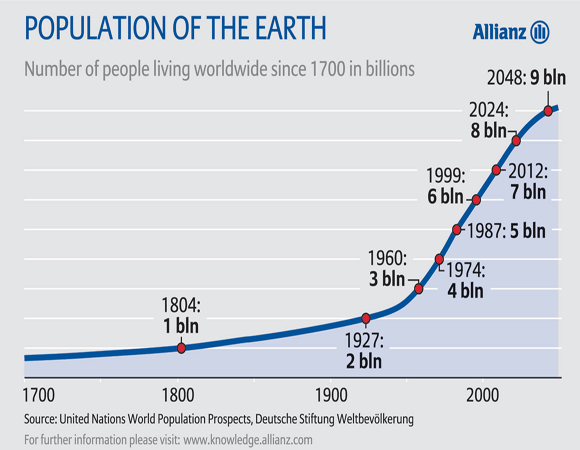
And then the US:
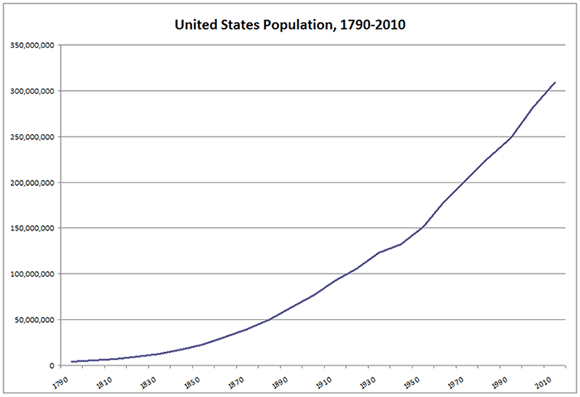
That is huge. But there’s another factor at play that, interestingly, is both a cause and a consequence of the population numbers: energy use. Again, first the world:
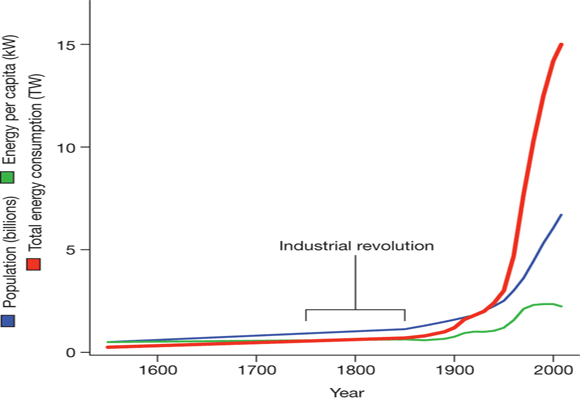
And the US:
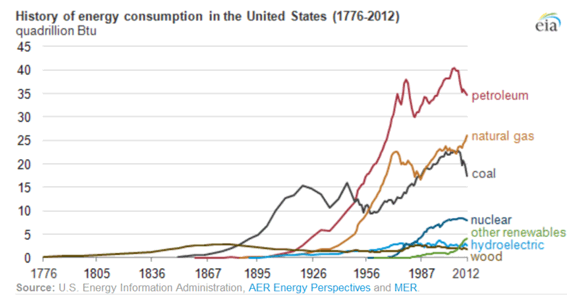
As should be clear, we’re looking at an exponential function multiplied by an exponential function. World population more than tripled, and all those extra people used 6-7-8 times more energy per capita then did prior generations. That’s 20-25 times more energy use in total. As I said, it should be no surprise that it should be no surprise that the Silent Generation is the richest ever.
But. But there’s one more graph that we should be careful not to leave out. if only because it’s interesting to see that the richest generation in human history, as they were coming of age, and while they were busy increasing their per capita energy use manifold, also started incurring more debt. Much more debt.
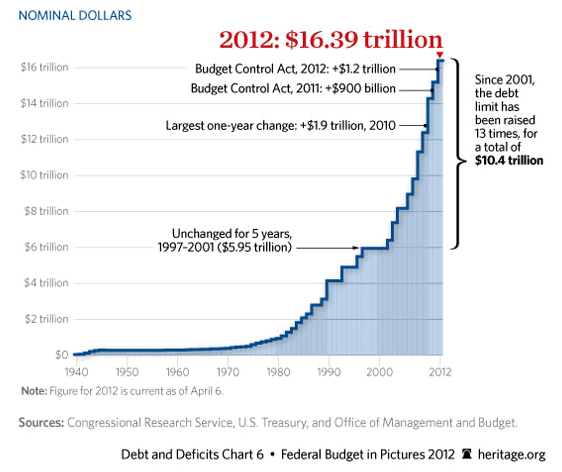
That last graph should make us wonder how rich they are exactly. Or, rather, how much of their alleged wealth will need to be serviced by their progeny. And then you have to ask what kind of wealth that is, exactly. Let’s turn to the Bloomberg article:
The Richest Elderly Generation Ever Doesn’t Like to Spend
Jon Burkhart was born during the Great Depression. [..] When he and his wife married in 1959, they lived in Texas and saved 10% of every paycheck. Thanks to well-timed equity and property investments, the 81-year-old now lives a much different life than the elderly he knew as a child. [..] The median net worth for the oldest Americans has climbed to near the top compared with other age groups from near the bottom just two decades ago .. This shift in buying power may not be a positive development for the economy as prime-age workers typically spend more than their elders.
The Silent Generation, born between 1928 and 1945, has benefited from improved health, a more generous social safety net, an exit from the job market ahead of the past recession and rebounding stock and home values. “They are in the sweet spot.” The median family net worth of Americans 75 and older was $194,800 last year adjusted for inflation, compared with $130,900 in 1989 ..Members of the Silent Generation are currently about ages 69 to 86. The title of richest ever will probably go unchallenged for now ..
Increased net worth of today’s elderly may not translate into a boon for consumer spending [..] household spending peaks at age 45 and then falls in every category except health care, dropping about 43% by the age of 75. The term Silent Generation was coined by Time Magazine in a 1951 article as the group was coming of age. It described the generation as “working fairly hard and saying almost nothing,” one that “does not issue manifestos, make speeches or carry posters.”
Not in 1951. They did not ‘not issue manifestos, make speeches or carry posters’ then. But they did in the 1960s, when they were in their late teens and up. It’s curious to see that those who did protest and wave banners and all, from Washington to Paris and beyond, concerned as they were with human rights, corruption and the environment, later became the wealthiest and most destructive people the world has ever witnessed, as a group, as a generation.
From 1962 through 1991, when mid-wave Silent Generation members were in their prime working years, gross domestic product grew an average of 3.5% a year. Since then, GDP has expanded 2.6% a year. The homes and financial assets they acquired as they aged saw outsized price gains over the decades. [..] Meanwhile the Federal Housing Finance Agency’s home price gauge has risen 472% since 1975.
For a large part of the ‘Silents’, rising home prices have been a substantial part of their wealth accumulation. Even when prices were falling in 2008, it didn’t matter much, because mortgages were long paid off.
Federal outlays on programs benefiting those 65 and older also became more generous over the decades. They rose to $27,975 in 2011 per capita adjusted for inflation from about $4,000 in 1960 [..] Consequently, 9.5% of Americans 65 and older were in poverty in 2013, lower than any other age group, according to the U.S. Census Bureau. That compares with 35% in 1959, when they had the highest poverty rate. Back then, “the poor people were old,” said Neil Howe, a demographer in Great Falls, Virginia. “That’s a really fascinating contrast with today.”
Ha! Yeah, fascinating, isn’t it?! Today, the poor people are young. But that’s a big problem, also for the older people. It’s sort of OK for now, just look at the average age of Senators and Congressmen and corporate shareholders. The old folk run the show, and they’re planning to hold on as long as they can,
“The Silents have done very well, and a lot of it has just been their location in history [..] They planned ahead, they were risk averse, they played by the rules and the system worked for them.”
That last bit sounds very cute, but a little too much so. The system didn’t just work for them, they were the system. They still are. They knew this in 1968, and so they can’t simply claim innocence after that. What happened is that they came from innocence, protested the system and then forgot all about it and themselves became the system.
Is it the population numbers, the energy use, or the debt increase that makes the Silent Generation so insidious? That is not even the most interesting issue, other than perhaps for historians. What’s far more intriguing is what the ‘Silents’ are going to do today and tomorrow, as they see their children and grandchildren sink.
Every parent used to want a better life for their sons and daughters than they had themselves. And there can be no doubt that most like nothing more then being fooled until they die by politicians’ promises of growth and recovery.
But one single honest look at younger generations should teach them that those promises are hollow and empty. Some can try and plead dementia, but even then.
I have no high hopes to see this resolved with grace and dignity and respect across generations, I think people across the board will be too reluctant to give up what they claim is theirs. If they are, though, that will mean the dissolution of entire societies, something that never happens in peaceful ways.
By Raul Ilargi Meijer
Website: http://theautomaticearth.com (provides unique analysis of economics, finance, politics and social dynamics in the context of Complexity Theory)
Raul Ilargi Meijer Archive |
© 2005-2022 http://www.MarketOracle.co.uk - The Market Oracle is a FREE Daily Financial Markets Analysis & Forecasting online publication.



